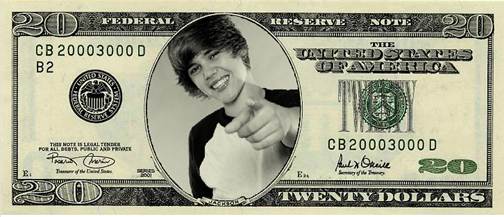Leaning on a soundboard in a Hollywood recording studio, Justin Bieber is about to make me an offer that would prompt instant hysteria among millions of American teenage girls: Do I want to be the first person outside of his inner circle to hear some rough cuts he’s considering for his upcoming album, Believe?
“You’ve gotta hear this, it’s crazy,” gushes the singer. “It’s called ‘Die in Your Arms.’” A moment later his ubiquitous lilt surges full volume from the stadium-quality speakers, a soulful love song reminiscent of early Jackson 5. Next he plays “Happier When We’re Together,” a ballad in which he worries a girlfriend will be unfaithful while he’s on tour. Standing up as his own beatboxing merges seamlessly with a drum machine at the beginning of “You’re the One,” he does an impromptu variation of the Moonwalk.
One can forgive him for the victory dance. Since his debut three years ago Bieber has sold 15 million albums, grossing $150 million on 157 tour dates across two dozen countries along the way. His biopic, Never Say Never, pulled in $30 million on its opening weekend, just shy of the concert-film record, and racked up $100 million at the box office in total. His fragrance, Someday, debuted last June and did $60 million in retail sales during its first six months on the market. Those income streams helped Bieber personally earn an estimated $55 million over the past 12 months and $108 million over the past two years.
“You have humans, and you have aliens,” says veteran hitmaker Timothy “Timbaland” Mosley, one of the producers on Believe. “I think he’s half-human and half-alien.”
Even more impressive than Bieber’s earning power: his vast social media reach, part of the reason he ranks third on this year’s Celebrity 100 list. Bieber boasts 21 million Twitter followers—more than any person on Earth not named Lady Gaga. His 43 millionFacebook fans are more than Mitt Romney’s and Barack Obama’s put together. With 740 million views, his breakout ballad, “Baby,” is the most-watched video in YouTube history; if you assume three minutes per song, his VEVO channel’s 2.4 billion impressions are enough to provide one minute of video to every person on the planet.
Bieber’s influence and moneymaking talents are fairly well established. It’s far more surprising what he’s doing with that cash. He provides a hint in the dim octagonal recording studio, owned by Rodney Jerkins, who had a hand in many of Michael Jackson’s late-career hits and is now producing songs for Believe. His dancing done, Bieber quickly settles into a chair behind a keyboard. Inspiration has struck: He starts tapping out a fresh beat, as comfortable with the sophisticated equipment as a pop star a generation earlier would be strumming a rhythm guitar. “Can you loop that, what I did?” he asks the engineer at one point. Bieber eventually turns to me: “The tech aspect is just fun for me.”
Bieber’s tech savvy infuses more than his music—it’s also a core strategy for how the entertainer intends to translate all that fame and fast money into enduring riches. Instinctively, he embraces a Peter Lynch model of investing—“I’m not going to invest in something I don’t like; I have to believe in the product”—but rather than load up on buy-what-you-know value stocks, the singer has been quietly plowing millions into private tech startups. According to his manager, Bieber holds stakes in a dozen such companies. FORBES was able to verify four: messaging platform Tinychat, social-curation app Stamped, gaming outfit Sojo Studios and, most critically, Spotify, the disruptive music service founded by Daniel Ek and backed by everyone from Sean Parker to Li Ka-shing.
These deals aren’t equity-for-endorsement trades. Bieber put cash into each one, and few of the companies have promoted their links to the singer. Spotify, which is still working to establish itself in the U.S., wouldn’t even discuss Bieber’s investment. Yet he’s among the most prominent examples in the new Hollywood game: tech-savvy celebrities using their fame to secure stakes in Silicon Valley while ordinary venture capitalists salivate on the sidelines.













